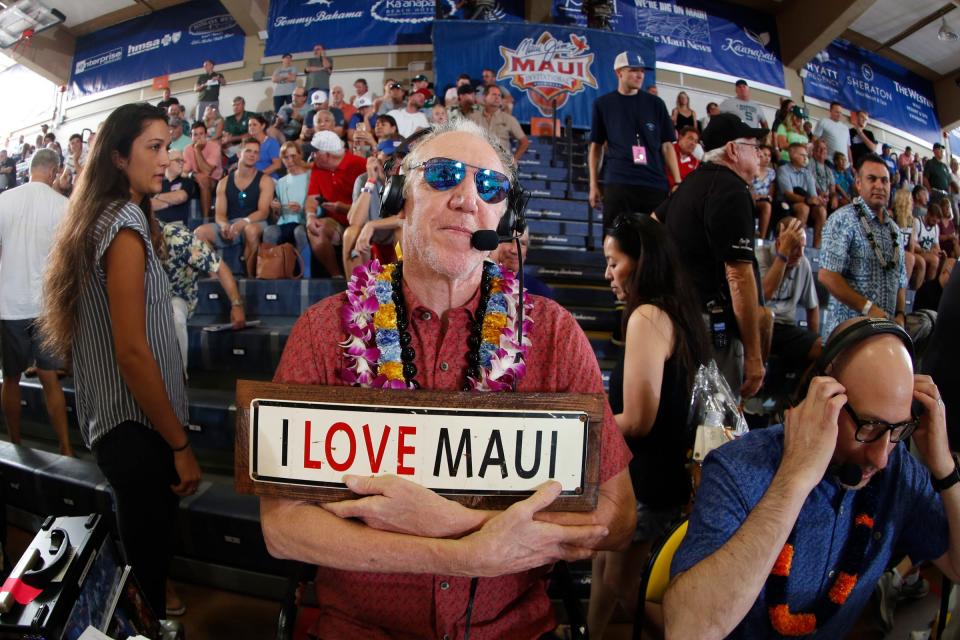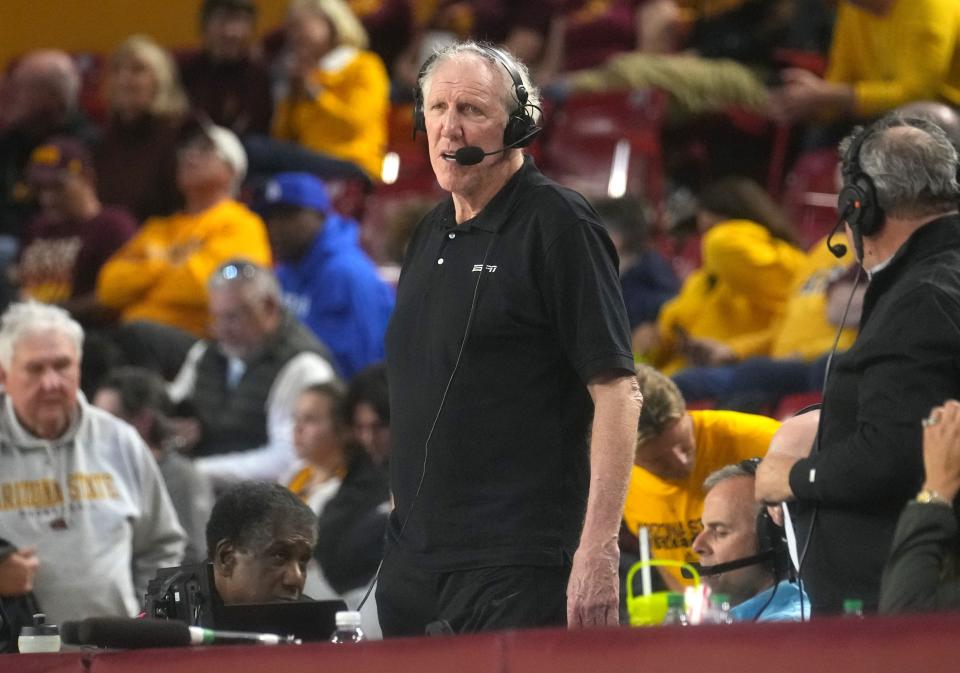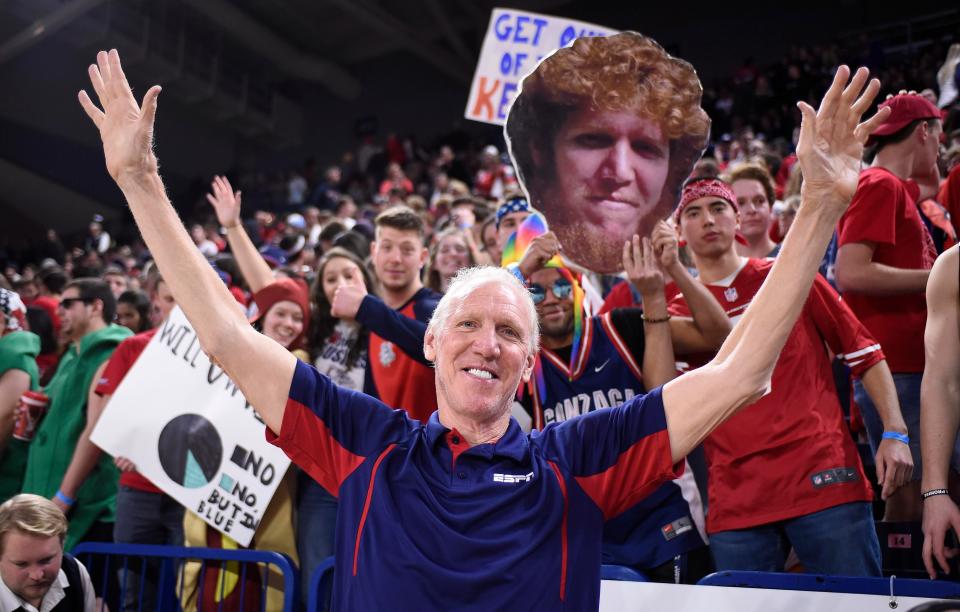Bohls: It's Bill Walton's rare voice, drive and pursuits that have made us the luckiest

Bill Walton would like to clear up a few things.
First, he never was introduced to hostage-revolutionary Patty Hearst, much less hid her away from the FBI at his Portland home. “Never even met her,” he said.
He never entertained even so much as a thought of quitting the UCLA basketball team during the height of its dynasty over a clash with legendary Bruins coach John Wooden over the length of Walton's hair.
“It never crossed my mind,” said the former 6-foot-11 center, who said he immediately biked to a barber shop for an impromptu haircut and was back in time before the end of practice. “There was nothing more important to me than being on the team.”
And Walton said the rumor’s wrong that he once quit the NBA in a pique one day in his total exasperation over his endless injuries with his feet and frustration about missing games during his first two woebegone seasons with the Portland Trail Blazers, only to call the front office back the following morning to rescind his resignation.
“No, that’s not true. It was not one day, but almost every day,” cracked the irrepressible force of nature that is Bill Walton. “That was a regular occurrence. I was unprepared, unsuspected, undiscerning when I joined the NBA. I learned a lot of lessons the hard way.”

Pretty much everything else is true about this towering, 70-year-old man-child who continues to assault our consciousness with his hankering for hyperbole as a broadcaster but also his unqualified love of the game on the eve of this year’s NCAA Tournament.
Bohls: Could Texas have its one shining moment?
Most of his life, from his infatuation with the Grateful Dead — he’s attended more than 1,000 of their concerts, but “only 20 a year” — to his constant “broken feet” with nonstop stress fractures, Walton's life on court and his offbeat sense of being has been an open book. And that’s appropriate because he remains an inveterate reader, no matter the topic.
We’ll learn more about Walton when ESPN’s latest 30 for 30 series appropriately titled “The Luckiest Guy in the World” airs this year. It chronicles the adventures of arguably the best and most fascinating college basketball player ever and one of the most impactful big men in NBA annals until a series of constant foot injuries prematurely curtailed his career. He was named to the NBA's 50 Greatest Players of all time.
Regrets? He’s had a few.
“I have endless regrets,” Walton said Monday from a California highway. “All the things I tried to do but only did halfway. Hopefully, I’m a smarter person today, a better person. I’m not where I want to be, but I’ll keep growing.”
And stay relentlessly positive.
But he doesn’t truly bemoan the 39 orthopedic surgeries, including the fusion of both ankles, both knee replacements, 15 broken noses and the loss of his front teeth up to 10 times because they’re part of his journey. Why would he? He’s also the happiest man in America.
Walton will be in Austin this week, and he’s as excited about laying eyes on Willie Nelson’s statue as he is participating for the first time at South by Southwest to discuss the upcoming four episodes about his life. The first two will debut at 11:15 a.m. Wednesday at The Stateside Theatre at the Paramount with a Q&A to follow.
“I’m looking forward to it,” Walton said. “I’m excited, proud, honored and privileged. I’m the luckiest guy in the world.”

Yes, we’ve heard. And we’re lucky to hear from him even though he might make our ears bleed occasionally by his off-topic riffs as a broadcaster for ESPN and the Pac-12 Network.
Golden: Coburn juggling football, fatherhood duties
Activism has been a way of life: 'I love being involved'
Without question, he remains one of the most compelling and complex college and pro athletes ever. Walton breathes in that same rarefied air as did Muhammad Ali, Jim Brown and Bill Russell — his longtime favorite — when it comes to a superstar athlete who used his celebrity to be outspoken on social and political issues, whether it’s a popular or inflammatory position. He’s used to both reactions, from the time he was arrested at a Vietnam War protest at UCLA and had to be bailed out by his coach — “I was coach Wooden’s easiest recruit to his worst nightmare” — to his undefined link to Hearst as a close friend of political activist, co-author and housemate Jack Scott.
“I am honored and privileged to stand and live in their shadows,” Walton said of those other athletic advocates for peace and racial change and harmony. “I love being involved. I’m an engaged citizen. I have a duty and obligation and responsibility to do as much as I can to make the world a better place.”
For sure, Walton’s as polarizing a sports figure as there has been the last century, but you can’t criticize his sense of engagement. Others should follow his lead instead of being told to just dribble.
More: SXSW panel urges the need for more athletes to embrace activism
“I would say Bill definitely in that conversation with those others,” series director Steve James said. “One could make the claim Bill was one of the most outspoken white athletes we’ve had. In Episode 3, we talk about the desire to make Bill the Great White Hope, but he resisted. He wanted no part of that.”
Walton didn’t intentionally clash with authority. He just questioned things, challenged what was too easily accepted. Still does.
Walton’s been the rarest of white superstar athletes, one who’s unfailingly candid about pressing social issues. Asked why others aren’t as willing to speak out about injustice, he said, “I can’t and don’t speak for other people. I try to encourage, to inspire, to try to illuminate and elevate. I am a product of the culture and people and leaders and choices I made in my life."
More: Timmy Allen healthy enough to play
Rebellious or curious? It all depends on points of view
And that foundation was set during a childhood when he was raised by two educator parents who had no interest in sports but introduced him to literature and sociology and compassion. That’s what shaped this inquisitive, probing young man whom James called “a poster child of the ‘60s.”
Asked if that characterization is correct, Walton deadpanned, “It depends on what posters you have.”
Walton wasn’t so much naturally rebellious as he was perpetually curious and inquisitive and opinionated and desirous of a more perfect union. He was simply engaged like few other athletes either before or since he dominated the college basketball scene with two NCAA titles and an 88-game winning streak and, as the best passing big man ever, won NBA championships first with Portland in 1977 and then with the Boston Celtics in 1986.
We can be thankful he didn’t go through with his plan to become a lawyer — he attended law school at Stanford during his time as a then-San Diego Clipper — in part because trials would never end, given his verbosity.
This week, Walton will aim for some Tex-Mex and genuflect at Willie’s statue, but he'll also root for his UCLA Bruins once the tournament begins. “They’re a really fun and inspirational team,” he said. “The effort they put forth inspires me and makes me proud.”
More: Texas women to face East Carolina
He’s still the freest of free spirits who has invaded our living rooms and the national consciousness with his provocative nature and his unquenchable passion. That’s also the message he hopes his 30 for 30 series delivers to people young and old.
“Find something you love and go for that with everything you’ve got,” Walton advised. “If you love what you do, you’ve got the greatest chance of being really good at it. Have a vision. Have a goal. Find a master teacher because there’s never ever greatness without leadership and coaching.”
What's next? Sky's the limit in Walton's eyes
Asked if there was a more diverse, captivating athlete than Walton, James said, “I’d be hard-pressed to name one. He really was a transcendent collegian. But there’s more to Bill’s story than just basketball. His activism was pretty compelling. He really was the first superstar basketball player and possibly athlete who was really seen as a hippie and part of the counter culture and he paid a price for that.”
Walton sees it just the opposite.
He infuriated some people, polarized others, was beloved by many and impacted tons, but he found it all benefited him, furthered his lifelong education and brought people in his path to shape his journey. He has always colored outside the lines.
Even today, he’s all about personal growth. And who knows where the journey takes him.
Politics, possibly?
Walton didn’t rule it out.
“I consider everything,” he said. “I have a vivid imagination.”
Of that we have no doubt. Maybe he’ll run on the Grateful Dead Ticket.
This article originally appeared on Austin American-Statesman: Even at 70, Bill Walton still a force of nature in broadcast, activism

